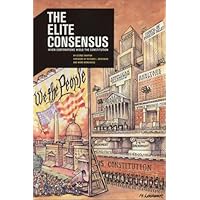
Average Reviews:

(More customer reviews)I came across this, studying the origin of paper money and modern economics.
The authors went through great technical effort and personal sacrifice to bring this to We The People. The Bibliography is nearly as long as the text to substantiate all facts. It details the corporate influences in what was once American Democracy. Get it, read it, share it. It will be banned if it becomes popular. It's THAT accurate.
Click Here to see more reviews about: The Elite Consensus: When Corporations Wield the Constitution
"The Elite Consensus: When Corporations Wield theConstitution," by George Draffan, a new book from the Program onCorporations, Law & Democracy (POCLAD), goes behind the veil of giantcorporations—Enron, Bechtel, Halliburton, Monsanto, Pfizer, andothers making our daily news—to show how the "system" really works.Draffan describes how corporations leverage power through think tanksand business groups to form an undemocratic system of governance overcitizens. He outlines the normal, everyday ways these institutionsshape the national investment and political policies, portraying how ashadow system of corporate power effectively governs.The corporate agenda is served equally by conservative, liberal, andlibertarian philosophies, according to Draffan.Corporate power, hewrites, descends from the U.S. Constitution and Supreme Court grantsof "personhood" and Bill of Rights protections to corporations.Unlike muckraking books about scandals in one industry or another,Draffan focuses on the mechanisms of power wielded by the entirenetwork of corporate players."Today's corporate leaders received a head start from the men ofproperty who wrote the Constitution," Richard Grossman and WardMorehouse, cofounders of POCLAD, wrote in their foreword thatsuccinctly summarizes the book's analysis."The Elite Consensus" names names. It reads like a playbill of actorson the stage of domestic and foreign policy who "wield theConstitution" to their own ends. It gives profiles of thoseplayers—think tanks, business groups and non-profitorganizations—whose "experts" are regularly quoted in themedia promoting corporate agendas with no reference to their corporatebackers. A valuable guide for activists, citizens, journalists,scholars and students, the book reveals the interconnections betweenthese organizations and their revolving-door relationships withgovernment. Interestingly, the book includes the Brookings Institution—atax-exempt think tank commonly considered liberal or centrist—whoseboard includes corporate CEOs from AT&T, Chase Manhattan, KissingerAssociates and Bank of America, a former director of the World BankRobert McNamara, and directors and trustees of major foundations."Corporate-driven think tanks and educators enjoy the prestige ofuniversity appointments where corporate agendas are developed anddisseminated," writes Draffan, Executive Director of the PublicInformation Network, Seattle, WA. "Corporate foundations decidewhich charities and which environmental groups get funded. Investmentbankers control more money than the World Bank and their unregulatedspeculation in national currencies has plunged Latin America and Asiainto financial crises.Governments have become mere salesmenpromoting multinational corporations, which are the ‘muscle andbrains' of the global economy.""The Elite Consensus" traces corporate funding of think tanks and organizations like the Business Roundtable, Chamber of Commerce, Council on Foreign Relations, Trilateral Commission, North Atlantic Treaty Organization(NATO), International Chamber of Commerce, Heritage Foundation, Brookings Institution, American Enterprise Institute, United Nations, and other non-profit corporations.Draffan describes how a single corporation—General Motors—affected the economies of both Mexico and the U.S when it laid off 99,000 U.S. workers between 1992 and l996.He said General Motors became the largest private employer in Mexico by moving its operations south of the border. U.S. union workers were replaced by lower-paid contract and temporary workers making Manpower, Inc.—a temporary employment agency—the largest employer in the United States.The political cartoon on the book's cover by nationally noted political artist Matt Wuerker illustrates the book's theme: the conflict between "We the People" and corporate power.His caricature of the Capitol building and Washington Monument shows a billboard hiding the buildings of corporate organizations whose power rests on the U.S. Constitution, supported by the building blocks of the 1st and 14th amendments. Constitutional amendments meant for citizens are the "rights" corporations use for themselves in the courts, as the book details.Anyone who was affected by the recent power blackout, lost a pension in a corporation that went belly up, or lost a job in a company whose work was sent to a country with cheaper labor, will want to read this book. Public indignation at the Enron and other corporate scandals indicates the public is hungry to know more about what is going on behind the scenes.
Click here for more information about The Elite Consensus: When Corporations Wield the Constitution

0 comments:
Post a Comment